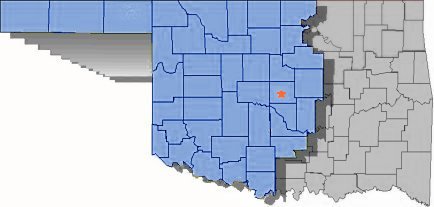About
The United States Attorney is the chief federal law enforcement officer for this judicial district. The Western District of Oklahoma is the largest of three judicial districts in Oklahoma and includes 40 of the 77 counties.

Alfalfa - Beaver - Beckham - Blaine - Caddo - Canadian - Cimarron - Cleveland - Comanche - Cotton - Custer - Dewey - Ellis - Garfield - Garvin - Grady - Grant - Greer - Harmon - Harper - Jackson - Jefferson - Kay - Kingfisher - Kiowa - Lincoln - Logan - McClain - Major - Noble - Oklahoma - Payne - Pottawatomie - Roger Mills -
Stephens - Texas - Tillman -
Washita - Woods - Woodward
The United States Attorney is responsible for representing the federal government in virtually all litigation involving the United States and its agencies. This includes criminal prosecutions for violations of federal criminal laws, prosecution of crimes committed in Indian Country, bringing civil actions to enforce federal civil laws, defending civil lawsuits against the United States, and its agencies, collection of debts owed to the United States in criminal and civil cases, and representing the United States in cases before the United States Court of Appeals for the Tenth Circuit.
The United States Supreme Court has described the role of the United States Attorney this way:
The United States Attorney is the representative not of an ordinary party to a controversy, but of a sovereignty whose obligation to govern impartially is as compelling as its obligation to govern at all; and whose interest, therefore, in a criminal prosecution is not that it shall win a case, but that justice shall be done. As such, he is in a peculiar and very definite sense the servant of the law, the twofold aim of which is that guilt shall not escape or innocence suffer. He may prosecute with earnestness and vigor -- indeed, he should do so. But, while he may strike hard blows, he is not at liberty to strike foul ones. It is as much his duty to refrain from improper methods calculated to produce a wrongful conviction as it is to use every legitimate means to bring about a just one.
Excerpt from Berger v. United States, 295 U.S. 78, 88 (1935)

 U.S. Department
of Justice
U.S. Department
of Justice